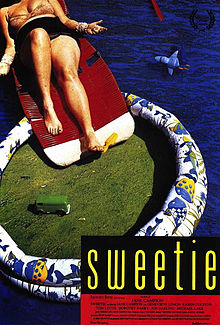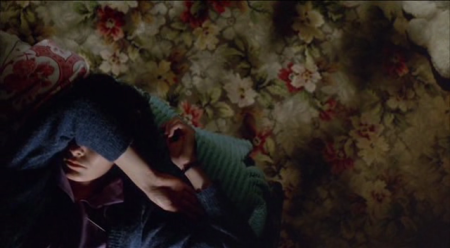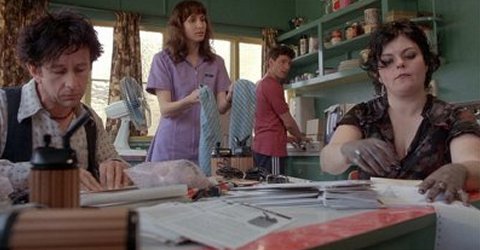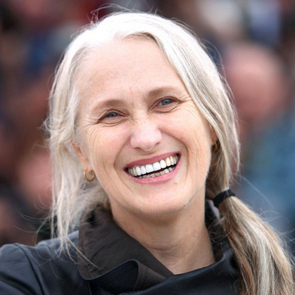Women's Pictures - Jane Campion's Sweetie
 Thursday, April 2, 2015 at 12:00PM
Thursday, April 2, 2015 at 12:00PM
 Welcome to Jane Campion month! When I asked you all to vote for our next Female Filmmaker, I was surprised when the New Zealand native won nearly half of the vote. In retrospect, I should have seen it coming. Jane Campion is one of the most honored ladies on our list! She’s been nominated for two Academy Awards (one of which she won) and two Golden Globes for The Piano in 1994, garnered three Emmy nominations for Top of the Lake two years ago, and she won the Palm d’Or in 1986, before our story with her even starts! We pick up with her three years after her prestigious win, with a sad, strange, sometimes silly story of one weird woman’s even weirder family.
Welcome to Jane Campion month! When I asked you all to vote for our next Female Filmmaker, I was surprised when the New Zealand native won nearly half of the vote. In retrospect, I should have seen it coming. Jane Campion is one of the most honored ladies on our list! She’s been nominated for two Academy Awards (one of which she won) and two Golden Globes for The Piano in 1994, garnered three Emmy nominations for Top of the Lake two years ago, and she won the Palm d’Or in 1986, before our story with her even starts! We pick up with her three years after her prestigious win, with a sad, strange, sometimes silly story of one weird woman’s even weirder family.
If taken at face value, Sweetie is a cautionary about how a daughter's untreated mental illness can cause an already unstable family to disintegrate. But nothing in Campion's surreal story is meant to be taken at face value. With the help of (lady!) cinematographer Sally Bongers, Campion shows a gift for making the mundane malevolent. When cast under shadows and seen through a wide angle lens, plastic furniture, dappled rugs, and the brightly-colored trappings of middle class suburbia suddenly suggest something rotten in the state of Australia. Campion refuses to shy away from the ugliness of her characters, instead covering them with candy colors that make them all the more grotesque.
Jane Campion's twisted family story after the jump

The main character is Kay (Karen Colston), a woman who firmly believes she is not in control of her own destiny. Kay falls in love with a man because tea leaves tell her that she will, sees ill omens in trees, and generally behaves like she’s trapped in a Greek tragedy. Even worse, she might be right - although not in the way she thinks.
It’s not an unseen, unknowable force that controls Kay’s destiny, but rather her familiar, loud, and attention-grabbing family. Her mother leaves her father, her father dotes on her sister, and her sister (from whom the film gets its title), combines the emotional maturity of a ten year old with the destructive force of a hurricane. Once Sweetie (Geneviève Lemon) blows back into Kay’s life with a drug addict boyfriend and a dream to be an actress, both the narrative and Kay’s agency fracture. From that point on, the film spirals into a series of vignettes of increasing strangeness, involving cowboys, treehouses, kiddie pools, and agents. And at the center of the swirling madness stands Sweetie.
Of the directors we’ve covered so far, Jane Campion is the first to have so fully realized a feature film debut. As a director, Campion shows none of the typical first-film timidity or lack of discipline. Sweetie is audacious. It eschews a typical plot structure, but the frenetic energy of each scene feels like the film is spinning forward towards a resolution, though the end is as surprising and unsettling as the rest. Campion also draws strong performances from her main actors, both Colston's obsessive, guarded Kay, and Lemon's all-id Sweetie. From the uncanny camera to the tragicomic characters, there's almost nothing about the film that suggests a first effort.

This deft control is entirely due to experience. Campion had already directed 5 shorts, a TV show, and a made-for-TV movie by the time she began filming Sweetie. In fact, her first short film, Peel, had won the Palm d’Or at Cannes in 1986. While Campion would continue to make films with themes similar to Sweetie - trapped women, psychological dramas, and powerful imagery would remain a constant - the contemporary weirdness would be toned down. Campion would instead turn to period drama, and force her audiences to look even further below surface images to really see her characters. Jane Campion's next challenge after suburbia: Jazz Age New Zealand.

This month on Women's Pictures:
 4/9 - An Angel At My Table (1990) - Campion tackles New Zealand history in this drama based on the autobiography of author Janet Frame. (Amazon Instant Video) (Hulu+)
4/9 - An Angel At My Table (1990) - Campion tackles New Zealand history in this drama based on the autobiography of author Janet Frame. (Amazon Instant Video) (Hulu+)
4/16 - The Piano (1993) - Jane Campion became the second woman in history to win an Academy Award nomination for this multi-Oscar winning drama about a mute woman in nineteenth century New Zealand. (Amazon Instant Video)
4/23 - Holy Smoke (1999) - Campion turns her camera towards India, where Kate Winslet may have joined a cult. (Netflix) (Amazon Instant Video)
4/30 - Bright Star (2009) - Join us for the Hit Me With Your Best Shot crossover with Campion's latest feature about poet John Keates. This is going to be a tough one to choose just one shot for. (Amazon Instant Video)



Reader Comments (18)
Anne Marie: I'd have suggested doing In the Cut as opposed to Holy Smoke! (because if you're going to cover 5 of her 7 films anyway, why not tackle the absolute worst of the lot?), but I'm sure you have your reasons.
I really like this film because, unlike so many other similarly toned movies with a young mentally ill woman at its center, it does not glamorize mental illness. It may tend toward surrealism at times, but it's also frighteningly realistic, particularly in how the three members of the family react differently toward Sweetie.
I loved this film when it came out. Time for a re-watchi.
I had fallen in love with "The Piano" so when I went to "Sweetie" it was a bit of a shock. I don't remember much of the film except how surreal Campion had managed to make suburban life look without resorting to any visual effects. It was one of those films that stuck in the mind after and I found myself admiring it more as time went on.
Volvagia - The choice was purely practical. Holy Smoke is available on Netflix, and In The Cut is not. Most folks have better access to Netflix, and I hope this series is something people feel like they can watch along with!
Suzanne - I was struck by that, too. Sweetie's illness is not glamorous or mysterious, nor does it give her truth-telling powers like mentally ill people in many other films. Unusual decision in an unusual movie!
No Portrait of a Lady? NOOOOOOOOOOOOOOOOOOOOOOOOOOOOOOOOOOOOOO etc.
This is such a monstrously perfect film. The way Campion visually describes psychology through her frames, bending the movie around Sweetie like the gravitational distortion of a black hole, it's amazing, natural-born filmmaking talent on display. For all that I love The Piano, I think I'm even more impressed by Sweetie. It achieves such incredible effects without any recourse to the distance provided by period dress and voiceover.
This is going to be an excellent month.
Laika -- i was hoping for Portrait too!
@Laika-Hell yeah! Portrait is a very underrated film.
Nathaniel et all - I wanted desperately to do Portrait of a Lady, but it's out of print AND unavailable for streaming. Somebody tell the studio to re-release it so we can do a proper Campion retrospective!
*heart-eyes*
You're such a good writer.
I never really get Campion. I can't get on board with her regular take on the feminist theme (i.e. women use their bodies/sexuality as their power), and almost every time I go to see one of her movies, I am disappointed, nay, bored. I do like both AN ANGEL AT MY TABLE and PORTRAIT OF A LADY, however.
Because of this, I will look forward to these posts, and maybe debating the pros and cons.
I much prefer her Palme d'or winning short.
Though I agree that Sweetie boasts a confidence that you usually find only in the strongest first features, I still feel it's hampered by the aggressive quirkiness and overstatement, and uneven acting, of the average first feature. Campion does subvert that quirky tone towards the end but, in my eyes, not enough to make this any more than an eye-catching but quickly exhausting curiosity.
I'm not too big on what she does with Henry James either so I'm not sad this series is skipping that one.
But The Piano is the reason she'll always rank among the greats, so looking forward to next week.
I don't like In the Cut but as far as failures go, it's definitely one of the more interesting/intriguing ones. It's a shame you're not covering it in this series, Anne-Marie, since I would've been extremely curious to hear your take on it.
I much prefer her Palme d'or winning short.
Though I agree that Sweetie boasts a confidence that you usually find only in the strongest first features, I still feel it's hampered by the aggressive quirkiness and overstatement, and uneven acting, of the average first feature. Campion does subvert that quirky tone towards the end but, in my eyes, not enough to make this any more than an eye-catching but quickly exhausting curiosity.
I'm not too big on what she does with Henry James either so I'm not sad this series is skipping that one.
But The Piano is the reason she'll always rank among the greats, so looking forward to next week.
I don't like In the Cut but as far as failures go, it's definitely one of the more interesting/intriguing ones. It's a shame you're not covering it in this series, Anne-Marie, since I would've been extremely curious to hear your take on it.
I much prefer her Palme d'or winning short.
Though I agree that Sweetie boasts a confidence that you usually find only in the strongest first features, I still feel it's hampered by the aggressive quirkiness and overstatement, and uneven acting, of the average first feature. Campion does subvert that quirky tone towards the end but, in my eyes, not enough to make this any more than an eye-catching but quickly exhausting curiosity.
I'm not too big on what she does with Henry James either so I'm not sad this series is skipping that one.
But The Piano is the reason she'll always rank among the greats, so looking forward to next week.
I don't like In the Cut but as far as failures go, it's definitely one of the more interesting/intriguing ones. It's a shame you're not covering it in this series, Anne-Marie, since I would've been extremely curious to hear your take on it.
I much prefer her Palme d'or winning short.
Though I agree that Sweetie boasts a confidence that you usually find only in the strongest first features, I still feel it's hampered by the aggressive quirkiness and overstatement, and uneven acting, of the average first feature. Campion does subvert that quirky tone towards the end but, in my eyes, not enough to make this any more than an eye-catching but quickly exhausting curiosity.
I'm not too big on what she does with Henry James either so I'm not sad this series is skipping that one.
But The Piano is the reason she'll always rank among the greats, so looking forward to next week.
I don't like In the Cut but as far as failures go, it's definitely one of the more interesting/intriguing ones. It's a shame you're not covering it in this series, Anne-Marie, since I would've been extremely curious to hear your take on it.
I haven't seen Sweetie but it was filmed in Australia. Is it set in NZ?
Thanks for catching that, Matt. The film doesn't specify, but I've fixed it based on filming locations.